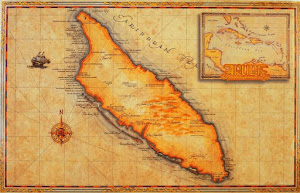The Long History of Aruba
The history of Aruba is a long one filled with many switches of government and power. When Christopher Columbus first discovered the Caribbean in 1492, he begins a race between many European countries to lay claim to as many Caribbean islands a possible. The island of Aruba's story of European colonization begins when it is first claimed by the Spanish in 1499. After this in 1500, Spain claims the entire Caribbean. Discovered by the Spanish explorer and conquistador Alonso de Ojeda, Aruba was declared one of Spain's useless islands due to its lack of natural resources. Because of this, the island was never colonized by pain and quickly became a refuge for pirates and buccaneers. Eventually, Spain began to use the island for wood cutting and cattle breeding. In the 1600s, Spains hold on the Caribbean began to weaken leading other countries to start taking islands out of Spanish control. In 1636 the Dutch took Aruba from Spain after an eighty-year-long war and claimed it as their own.The Dutch began their colonization of Aruba in 1643 when they appointed a Dutch governor to rule over Aruba and other Caribbean islands under Dutch control. Under Dutch rule, slavery in Aruba was not a very big part of life with the enslaved population on Aruba never exceeding twenty-one percent of the total population. This lasted until 1863 when slavery was abolished in Aruba and replaced with peasant culture like most of the Caribbean had. Aruba was modernized in the 1920s when the oil industry was introduced to the island. With the founding of the Lago Oil Refinery in 1924, the oil industry became the main source of employment for the island of Aruba. Thousands of jobs were created when World War II began and oil was high in demand. With World War II ending and oil no longer in high demand, Aruba needed to find a new source of income and jobs for the country and switched to tourism. In 1947, the Aruba Tourist Commission was created to promote tourism to the island and provide jobs for the population. When the oil refinery closed in 1985, the tourism side of the economy grew significantly. Tourism remains the main source of income and jobs for the island to this day. In recent years, Aruba has made strides to become independent starting with gaining autonomy in 1986. According to Aruba.com, after gaining autonomy, "tourism in Aruba grew at almost twice the rate of tourism in the entire Caribbean." Aruba planned to gain full independence but it was postponed indefinitely. To this day Aruba is an autonomous part of the Netherlands.
Sources:
- “Aruba Tourism - History of Tourism & The Aruba Tourism Authority.” History of Tourism & The Aruba Tourism Authority | Aruba.com, 2021, www.aruba.com/us/our-island/history-and-culture/aruba-tourism.
- “Aruba.” The Virtual Caribbean Library, ggccaribbean.wpengine.com/listing/aruba/.
- “A Brief History of the Caribbean.” Zegrahm Expeditions, https://www.zegrahm.com/blog/brief-history-caribbean.





You have a lot of facts about Aruba which is nice to see. I didn't know that Aruba was declared one of Spain's useless islands due to its lack of natural resources. This fact in my opinion is interesting. To think it wasn't colonized and taken over is hard to think about. The Dutch came to colonize Aruba after that fact is monumental. Your page seems very insightful, I wouldn't have much to critique on besides chunking up your paragraphs so it's a little easier to read.
ReplyDelete